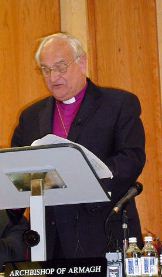



|
|
|
TUESDAY'S NEWS
Exhorting the Church of Ireland to call on the governments of Britain and Ireland to “devote a definite and realistic percentage of national wealth to world development as a constant and normal element of national expenditure”, the Primate wondered whether “direct taxation should reflect a permanent contribution to national aid for the poor of the world”. This issue, he said, was “about the use of national wealth” and the time to respond was now. Issues of power also manifested themselves in the growing debate on sustainability of the world. This was a matter of ethical and moral dimensions to do with the natural environment, but was also about “the political realities of power in a world divided between those who have and those who have not”. Referring to the Church as one of the last social places able to be “resistant to materialism”, Archbishop Eames called for a “deep spiritual and ethical vision” in the face of human greed and self-advancement in all their forms. A further area where power and powerlessness played a part was the peace process in Northern Ireland, where the failure to restore devolved government was a set-back to the political element of the road to peace. But it was only a set-back, the Primate said, and political progress was “only a part” of the peace process. The real power to build a just and peaceful society, he told his listeners, rested “with people in their lives, in their homes, in their work, in their relationships and in their attitudes”. Many people, said Archbishop Eames, felt “a lack of relevance for their lives in high-level political dialogue” but were finding new ways to exercise ‘people power’ in “local bridge-building, hands of friendship unimagined a few years ago, new local community initiatives and a new awareness of the power of individual and collective memories”. Singled out for particular acknowledgement was the support of the International Fund for Ireland in funding a new Scoping Study on sectarianism in Ireland, to be presented to the General Synod this year. The Church of Ireland, said the Primate, had “begun a profound and extensive examination of sectarianism” within its structures and attitudes, and must now “recognise the power to change and to respond to the call of ‘the hard Gospel’”. The final aspect of Church of Ireland life focussed on was the pastoral ministry, an area which the Church’s structures must, the Archbishop said, “be the servant of the ethos we have inherited, not the master”. Addressing the Synod as the supreme law-making body of the Church, he told members that the exercise of authority was “about the nature of power”. Focussing particularly on sexuality, the Primate told his listeners that issues of sexuality had been “on the agenda of the House of Bishops for many years” and it was increasingly clear that there was “a variety of responses to these issues among church members”. It was important to recognise, he said, that “power and authority must be exercised with genuine sensitivity to the feelings of other people” and this meant engaging in “open discussion” which would not lead to the emergence of a “Church-dividing issue”. The Bishops hoped to complete a paper on the subject of sexuality for the Church of Ireland to discuss at different levels, in the belief that the Church would be led “to make wise and compassionate decisions deeply rooted in the faith of Jesus Christ”. The Primate ended his speech by reminding Synod members that “the Gospel imperative must be the centre of our work as a Synod but it must also be at the centre of our life, worship and witness as a Church”. He commended to the Synod his prayer that, following the apparent powerlessness of the Christ of Good Friday, “we must move forward together with the real power of the Christ of Easter morning”. |
![]()
If you have any questions, comments or problems
please contact us.
Copyright © 2003 Church of Ireland. All rights reserved.
